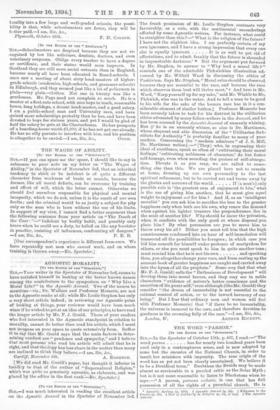[TO THE EDITOR OF THE " EPIOCTATOR."]
was much interested in reading the excellent article on the Agnostic Annual in the Spectator of November 3rd.
The frank pessimism of Mr. Leslie Stephen contrasts very favourably, as a rule, with the sentimental maunderings affected by some Agnostic writers. For instance, what could be straighter than this ?—" What is the religion of the future P I have not the slightest idea. I am perfectly certain of my own ignorance, and I have a strong impression that every one
else is equally ignorant It is as well to get rid of affectations, and to admit frankly that the future is shrouded in impenetrable darkness.' a But the argument put forward by Mr. Stephen, in answer to "Why lead a moral life ?" reminds one of the admirable Pickwickian illustration ad- vanced by Mr. Wilfrid Ward in discussing the ethics of Positivism. Says Mr. Stephen, " Moral rules should be observed because they are essential to the race, and because the race which observes them best will thrive most."t And here is Mr. Ward, "Keep yourself up for my sake," said Mr. Winkle to Mr. Pickwick, who was in the water. And to tell a man to be good to his wife for the sake of the human race has in it a con- siderable element of similar bathos. Professor Momerie has been severely taken to task for his distrust in the utilitarian ethics advocated by many fellow-writers in the Annual, and he has been accused by the Agnostic Journal of unmanly whining. But 21 he is an unmanly whiner, so also is Dr. Martineau, whose eloquent and able discussion of the "Utilitarian Sub- stitute for Authority" is probably familiar to many of your readers. Concerning the "modern admirers" of J. S. Mill, Dr. Martineau writes § :—" [They] who, in expressing their ideal of excellence, speak so often of cultivating their moral feelings," cultivating nobleness of character,' do but foster self-homage, even when sounding the praises of self-abnega- tion. Elevate it as you may, we are called to some- thing else than this. We are placed here not to remain at home, dressing up our own personality to the last spiritual refinement, but to be carried out and borne away by the glories and sorrows of the world If [a man's] only possible rule is the greatest sum of enjoyment to him,' what is the use of giving him another, that he must give equal weight to enjoyment not for him ? And if, as an 'intelligent moralist' you can ask him to sacrifice the less to the greater happiness only when both are his own, why renew the demand when against his lighter treasure the preponderance lies in the scale of another life P Why should he incur the privation, when it conflicts with the only good at whose disposal you place him P By what persuasion are you to move him to throw away his all? Either you must tell him that the high consciousness condensed into an hour of self-immolation will transcend all the possibilities he foregoes ; in which case you bid him consult for himself under pretence of martyrdom for others, or else you must speak to him in quite another tone ; must remind him that he is not his own and speaking thus, you altogether change your vooe, and from casting up the account-book of greater happiness are caught and carried away into the hymn of all the prophets." Some may find that what Mr. F. J. Gould II calls the "Enthusiasm of Development" will develop them into moral heroes, and they may see in noble characters "evidence of nature's better conscience and the assertion of its purer self," even although (like Mr. Gould) they consider ".the dream of immortality is not essential to the rational control of action, or to the inward harmony of our being." But I fear that ordinary men and women will feel with Professor Momeriell that "if there be no immortality, the universe is immoral to the core, and therefore devotion to goodness is the crowning folly of the race."—' am, Sir, 8te.,






































 Previous page
Previous page